- Home
- Terry C. Johnston
Wolf Mountain Moon Page 8
Wolf Mountain Moon Read online
Page 8
“Why, General?” asked Hargous. “Shouldn’t we be happy that we’ve made sure that Sitting Bull hasn’t started north for Canada?”
Miles’s eyes narrowed into slits. “No, Lieutenant. Because if Sitting Bull slips south of the Yellowstone, whether he joins Crazy Horse or not … it means that neither of them will be my prize. Instead—they’ll likely fall right into the lap of George Crook!”
The following day the soldiers cheered one another at their breakfast fires with something William Jackson knew nothing of, banging their cups together and otherwise making merry beneath clearing skies.
“Happy National Thanksgiving Day!” they shouted to one another in celebration around the flames.
“A day to give thanks!” others would cry.
William looked at the Lakota half-breed named Bruguier and shrugged. “I’ll give thanks they ain’t asked me to go across that river.”
“Not yet, they haven’t,” Big Leggings said.
Just after breakfast Miles called for scout George Johnson to carry another dispatch to Bennett at Carroll City while the rest of the command waited for the ice build up in the Missouri. Then around noon Robert Jackson and Lieutenant Bailey returned from Carroll City, having met Johnson on the road. Captain Bennett informed Miles that he had been successful in securing the trader’s ammunition and would start back the following day, a Friday.
But the best news on that National Thanksgiving Day came from an unexpected source. Within the hearing of Nelson Miles, half-breed Robert Jackson just happened to mention to others that the Missouri was frozen solid no more than eighteen or so miles upriver.
Miles whirled on his heel, asking, “No farther than that?” Enthusiasm was back on his face.
Robert nodded.
“Must be near Fort Hawley,” William instructed.
“Right near there, brother,” Robert agreed.
“What’s this Fort Hawley?” demanded the colonel.
“Old fur-trading post,” William explained.
Miles asked, “Anyone still there?”
Wagging his head, William said, “Not recent. Everyone’s been gone a long time. All gone. Empty place now.”
Slapping his mittens together, Miles wheeled back to some of his staff. “Officers’ call, Mr. Bailey! Lieutenant Baldwin—help Bailey get everyone in here now! We must make ready to break camp!”
“Where to, General?” Baldwin asked when he trotted up.
“Upriver to an abandoned post called Hawley,” Miles declared, smiling in that dark beard of his. “I’m told the river’s solid up there and we can cross tomorrow.”
“C-cross tomorrow,” Baldwin sputtered. “What about the rafts we’ve built—all that work … the men we’ve shipped to the other side, sir?”
“Yes, well,” and a look of consternation clouded Miles’s face. “Yes: see that we signal word for them to march upstream along the south bank, and we’ll soon be reunited once we reach solid ice!”
*The term used by the Lakota Peoples for Slim Buttes, Trumpet on the Land, vol. 10, The Plainsmen Series.
†The “Muddy Water River,” the Missouri River.
*The Yellowstone River.
†International border.
#Canada.
Chapter 6
22 November-7 December 1876
Wasn’t a lick of sense in pushing on east, Luther Kelly figured. Not with all the new snow falling to obliterate the tracks he and the other three had been following to see just where the Sioux might be scampering off to.
That Wednesday, the twenty-second, the four of them put Wolf Point at their backs and pointed their noses west, intending to do what they could to eat up that distance between them and Captain Snyder’s battalion somewhere up the valley of the Big Dry.
Climbing the ridges to the south of the Missouri, the scouts kept to the high ground—the better to see over the surrounding countryside for great distances: watching not only for the soldier column, but wary for any of the Sioux sure to be in the area. But the only thing moving besides them that gray, somber day were some antelope cavorting atop the snowy heights.
Shadows were lengthening late that afternoon when Jim Woods spotted a half-dozen buffalo grazing down at the bottom of a bowl where a few cottonwood saplings promised the men would find a spring at best, some seep at worst. When Kelly’s men agreed that there would be nothing finer than buffalo meat to roast at that evening’s fire, Woods loped on down and dropped a two-year-old bull.
“Can’t be too wise for us to be moving on now,” John Johnston said.
Luther nodded, regarding the west. “Sun’s headed to bed, and it sure wouldn’t be healthy for us to show ourselves along the skyline after Jim’s shot. We best camp in here.”
After pulling the saddles and blankets from their horses, the men took out their small camp axes and began chopping down the smallest and most tender of the cottonwood saplings. From them the scouts trimmed the branches, then laid the trunks in a pile before their horses. Although cattle would most times chew on cottonwood buds in the spring, they wouldn’t gnaw on the bark itself the way a horse would when hungry enough.
Stepping back, Kelly crossed his arms in satisfaction as their mounts took right to nibbling on the cottonwood. “Nothing a horse likes better than this here green bark of the yellow cottonwood, boys.”
While Kelly and Billy Cross scrounged through the cottonwood grove for some squaw wood and kindling, Woods himself went to work on the butchering. Plainsman tradition dictated that the tongue and hide went to the man who had killed the animal. So with the tongue laid near the fire pit, Woods staked out the green hide near their fire, fur side up, right where he planned to make his bed for the night—then spread his blankets on that layer of thick insulation that would protect him from the cold ground.
By the time the first stars were twinkling into sight, the scouts had their peeled cottonwood wands prepared. From the ends of them hung juicy red pieces of buffalo the men suspended over the merry flames, grease dripping and sputtering into the fire. After dinner the coffee was boiled and the pipes came out as the air continued to cool, sliding past the freezing point.
The following morning the four were off at dawn without making breakfast, taking with them some of the cooked meat left over from last night’s hearty feast. Upon reaching the valley of the Big Dry itself, Kelly’s bunch finally discovered Snyder’s trail poking its way up a northern branch. At that point the scouts decided they would rest some, giving their horses a chance to graze on the thick bottomland grasses and themselves an opportunity to work on the cold meat in their saddlebags.
Resuming their march up the branch of the Big Dry, they entered a flat section of country, where they soon spotted a distant horseman sitting still upon a ridgetop, watching their progress. The scouts waved, hoping to receive some sign of friendliness in return, but instead the horseman disappeared over the far side of the hilltop.
“Injun or white man?” Woods asked.
“Weren’t no Injun,” Johnston surmised. “No feathers. Didn’t see me no shield.”
Luther said, “White man would’ve come on down—don’t you figure, fellas?”
“Likely so,” Woods agreed. “Best we keep our eyes skinned here on out.”
Not long after pushing on up Snyder’s trail, at the base of the ridge where they had spotted the lone horseman, the scouts entered a rough, broken country slashed with brushy ravines and cutbanks jaggedly scarring their way down from the high ground.
A single shot suddenly rang out … then a ragged volley of rifle fire spat orange from nearby bushes just ahead of them.
It was all Kelly and the others could do to control their horses at that moment as the animals reared and kicked, doing their best to twist about and flee. Cross and Luther were the first to get their rifles up and pointed at the brush where the gun smoke hung among the leafless branches. Both of them fired.
From the vegetation across the coulee burst at least five figures, breechclouts s
waying like flags, feathers flapping as the warriors turned tail and fled up a wide ravine.
Likely they’ve got their ponies hid up there, Luther thought.
For the next few minutes the scouts loped up and down that piece of broken ground, trying to find some way round to get at the fleeing warriors—but in the end could not because the ravine was too wide and deep to cross.
“They picked their spot good,” Woods announced breathlessly as they gathered once more.
Their eyes were still watchful and wary, their weapons still at the ready.
“Bet that son of a bitch we spotted back up yonder on top of the ridge give the rest of ’em the word we was coming through,” Cross declared.
“A good spot for an ambush,” Kelly agreed. “Place where they could get us close enough to do us all in—and be quick at it.”
Johnston said, “I figger one of ’em got a itchy finger afore we was all in their trap.”
“You can thank your lucky stars for that,” Kelly told them. “If they’d all been patient men—”
“We’d all be dead men,” Woods interrupted.
“C’mon, fellas,” Kelly said, sawing his horse back to the northwest again. “Time we pushed hard to catch those soldiers. This country’s turned out to be a mite less than friendly.”
They didn’t catch up to Snyder’s battalion until the following evening, Friday, the twenty-fourth, far to the northwest up that tributary of the Big Dry. And for the next three days the column marched and camped, marched and camped, suffering the slush and mud during the day, then enduring the galling cold at night, without once encountering an Indian trail nor any sign of the warriors who had ambushed the scouts. On the twenty-seventh Snyder’s battalion finally reached the rendezvous site at Black Buttes.
“It’s like Sitting Bull’s village just up and disappeared,” Billy Cross said the night of the twenty-seventh at their fire.
“Maybeso they crossed over the Missouri,” Johnston declared.
“We’d a’seed the place where they crossed, don’t you figger?” Jim Woods argued.
“Doesn’t make much sense, that much is true,” Kelly explained. “If the Sitting Bull people were running west, why—one of these battalions should have bumped into ’em by now.”
Woods slapped his knee, saying, “At least seen some hide or hair of ’em!”
On the following day, Tuesday, the twenty-eighth, Snyder ordered F and ? companies to remain in camp while Irish-born Captain Edmond Butler was directed to lead C and D on a patrol up that north fork of the Big Dry with Kelly as their guide. Just past noon it began to snow, then quickly thickened into a howling storm before Butler’s detail turned back to their bivouac, emerging ghostlike out of the whipping, cavorting snow behind their scout, who successfully brought them in without losing his way in the blizzard.
“You find anything?” Woods asked as Kelly dragged saddle and blanket to the ground.
Luther collapsed right beside his gear. “Not a feather, Jim. Can’t tell you what we might’ve seen if the weather hadn’t closed in on us.”
Cross walked up to ask, “You think Sitting Bull’s out there?”
Luther took a moment, then wagged his head. “I don’t think we’ll find him. Maybe Miles will. But as for us—I got a strong feeling we’re poking down the wrong rabbit hole.”
The fierce wind had sculpted the snow into huge icy drifts by dawn the following morning. Nonetheless, Snyder was of a mind to try to break a trail and continue his push north. His column struggled no more than two miles in more than five hours of grueling march. The captain conferred with Butler, then decided they would bivouac right there. At the order weary men fell to either side of their narrow foot trail hammered through the snow, collapsing back into the icy drifts, exhausted, shuddering with the tremendous cold as a relentless wind continued to blow ground snow about them.
On Thursday, the thirtieth, National Thanksgiving Day, Captain Snyder called Luther over to his windbreak formed by an outstretched gum poncho.
“Kelly, I want you to pick two men. Leave the others with us.”
“You want me to go back out to scout for the Indians who aren’t there?”
“I understand your position perfectly,” Snyder replied. “And, frankly, I’m beginning to agree with you.”
“Where are you sending me, if not to look for the Hunkpapa?”
“Find Miles,” Snyder requested. “Maybe he’s bumped into the hostiles north of the river for some reason and can’t rejoin us here as he planned.”
“You afraid he might have pitched into something more than he could handle?”
Snyder looked away and shrugged slightly. “All I know is that the time for our rendezvous here at Black Buttes has come and gone—and I have no idea where the general is.”
“How long can you hang in here, Captain?” Kelly asked.
“My quartermaster sergeant tells me we’re running low on everything. I can cut the men’s rations—but we’re damn well out of forage for the stock already.”
“Which means you’ll have to turn back for the Tongue before too long.”
“Give yourself two more days, Kelly.” Snyder said it almost like a prayer as he shuddered, pulling his blanket more tightly under his chin. “Go see what you can find out about Miles—then get back here by December second.”
On the evening of the thirtieth of November, Colonel Miles separated his command from a battalion he would have led by his most trusted officer. That night Frank Baldwin and Companies G, H, and I camped apart with their scout, Vic Smith. Just after sundown they drew their rations and the forage for their complement of six-mule teams, loading it and their ammunition into thirteen wagons, then spent their first night apart from the rest of the regiment.
Before dawn on the following morning, 1 December, Lieutenant Frank D. Baldwin led those three companies of 112 men beneath the light of a full moon, their noses pointed east on a chase after Sitting Bull’s swelling camp of hostiles last reported to be gathering somewhere on the Redwater River … even if that chase would take him all the way to Fort Buford at the mouth of the Yellowstone.
There were no written orders. After seven years of serving Miles on the southern plains, the commander of the Fifth Infantry trusted Baldwin’s judgment implicitly in the field. After all, Baldwin was a non-West Pointer, like himself. Forget all that politics and book learning, Miles believed. If he wanted a job done, turn it over to a man like Frank Baldwin: pure gumption, grit, and fighting tallow.
In the meantime Miles himself planned to continue upstream with the remaining two companies, A and E, along with the Napoleon gun, making for Fort Hawley, where he would cross the Missouri ice to the south bank, explore the upper drainage of the Big Dry until his rendezvous with Snyder’s battalion. Together the two battalions would then march south to the Tongue River Cantonment for resupply.
Sloshing through thick mud, which at times turned into a quagmire of quicksand, forced to hack their way through a thick maze of brush and deep snowdrifts in those rough breaks north of the Missouri, Miles’s battalion finally limped into bivouac late that Friday night after a torturous nineteen miles. At dawn the next morning the command continued on upstream, cutting a path through the underbrush for their wagons and digging out a serviceable road until they reached a point opposite Fort Hawley, abandoned for some seven years. After they had corduroyed the riverbank, the wagons and men crossed the groaning ice to the south bank.
For a few moments Miles dismounted to stand among the ruins of the post—now nothing more than a few charred timbers sticking from the new snow like blackened broken bones jutting from a wound, an iron stove broken and turning to rust, and the fort cemetery. Nelson removed his hat and silently mouthed the words of a short prayer as he stared at all those faded, graying, faceless wooden headboards leaning a’kilter between earth and sky.
With the crossing of the frozen Missouri at the Hawley ford complete, the column was immediately faced with a new predicament.
On the south side of the river the banks rose like an abrupt wall before them.
At first Miles tried hitching a double team of twelve mules to one of the nearly empty wagons to get his supplies up the bluffs. Yet the animals could not struggle up the sharp-pitched trail. Left with little choice, the soldiers emptied the wagon beds once more, then removed the boxes from their running gear—so box, running gear, and small loads of supplies could be dragged up on ropes by the men working in concert with the mule teams. Even as cold as it was, what with the way the wind blustered at the top of the bluffs, the soldiers sweated their way through the lion’s share of that day and into the coming of night.
By ten P.M. the battalion finally settled into their bivouac on the top of the prairie, high above the Missouri River among the pine and cedar that provided a little windbreak to their cookfires, where juicy slabs of venison roasted, in a spot the foot-sloggers affectionately named Camp Elevation.
As twilight deepened into night, the pickets were the first to spot some fires glowing on the north side of the river.
“In the morning,” Miles told William Jackson, “I want you to find out if that is friend or foe.”
“I think your captain—the one my brother Robert took to Carroll City.”
Miles nodded glumly. “Yes, I suppose you’re right, Jackson. What with the reports of Sitting Bull being far to the east of us, it’s not very likely that he’s camped over yonder, is it? Not when he’s eluded me a second time in as many months.”
Nelson was morose enough that night that he found it hard to sleep—thinking and rethinking how Sitting Bull had outsmarted him not just once, but twice now—brooding how chasing the Hunkpapa was like chasing after wisps of winter smoke. Close enough to smell his prey, near enough to see, perhaps, but nothing to grab hold of—not a damned thing in your hand once you opened it.

 Black Sun, The Battle of Summit Springs, 1869
Black Sun, The Battle of Summit Springs, 1869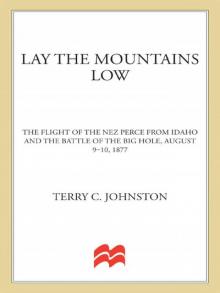 Lay the Mountains Low
Lay the Mountains Low Black Sun: The Battle of Summit Springs, 1869 (The Plainsmen Series)
Black Sun: The Battle of Summit Springs, 1869 (The Plainsmen Series)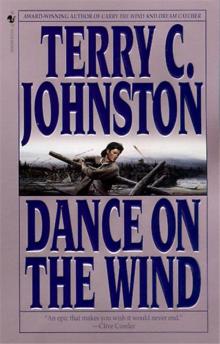 Dance on the Wind tb-1
Dance on the Wind tb-1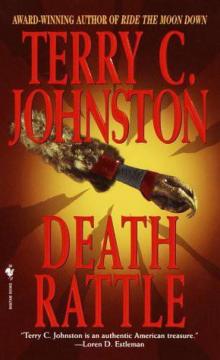 Death Rattle tb-8
Death Rattle tb-8 The Stalkers
The Stalkers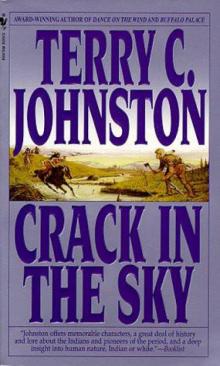 Crack in the Sky tb-3
Crack in the Sky tb-3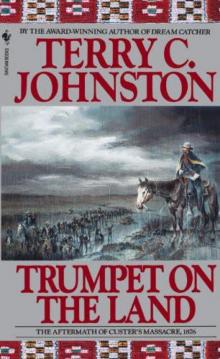 Trumpet on the Land: The Aftermath of Custer's Massacre, 1876 tp-10
Trumpet on the Land: The Aftermath of Custer's Massacre, 1876 tp-10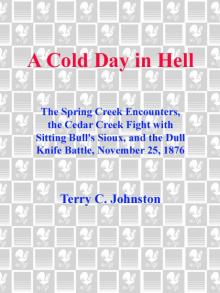 A Cold Day in Hell
A Cold Day in Hell Long Winter Gone: Son of the Plains - Volume 1
Long Winter Gone: Son of the Plains - Volume 1 Buffalo Palace
Buffalo Palace Cries from the Earth
Cries from the Earth Death Rattle
Death Rattle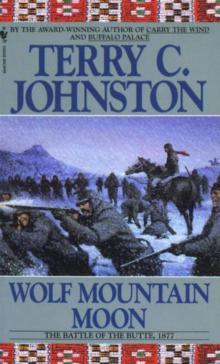 Wolf Mountain Moon: The Battle of the Butte, 1877 tp-12
Wolf Mountain Moon: The Battle of the Butte, 1877 tp-12 Crack in the Sky
Crack in the Sky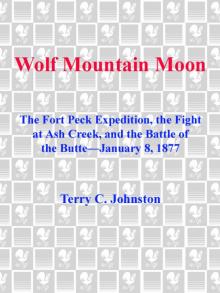 Wolf Mountain Moon
Wolf Mountain Moon Turn the Stars Upside Down: The Last Days and Tragic Death of Crazy Horse
Turn the Stars Upside Down: The Last Days and Tragic Death of Crazy Horse Winter Rain
Winter Rain Shadow Riders: The Southern Plains Uprising, 1873 (The Plainsmen Series)
Shadow Riders: The Southern Plains Uprising, 1873 (The Plainsmen Series)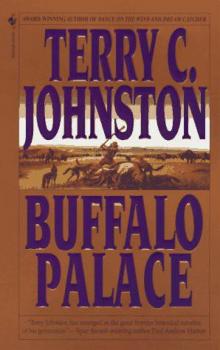 Buffalo Palace tb-2
Buffalo Palace tb-2 Cries from the Earth: The Outbreak Of the Nez Perce War and the Battle of White Bird Canyon June 17, 1877 (The Plainsmen Series)
Cries from the Earth: The Outbreak Of the Nez Perce War and the Battle of White Bird Canyon June 17, 1877 (The Plainsmen Series)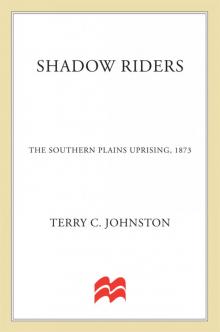 Shadow Riders, The Southern Plains Uprising, 1873
Shadow Riders, The Southern Plains Uprising, 1873 Ashes of Heaven (The Plainsmen Series)
Ashes of Heaven (The Plainsmen Series) Ashes of Heaven
Ashes of Heaven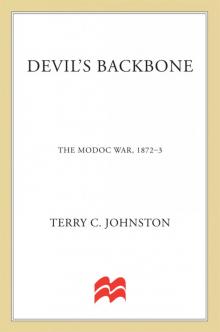 Devil's Backbone: The Modoc War, 1872-3
Devil's Backbone: The Modoc War, 1872-3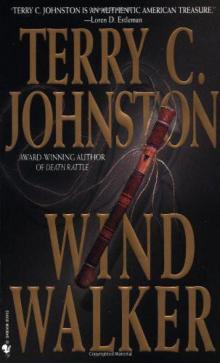 Wind Walker tb-9
Wind Walker tb-9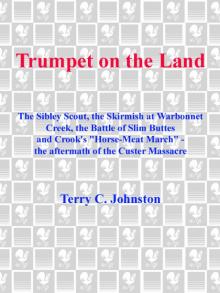 Trumpet on the Land
Trumpet on the Land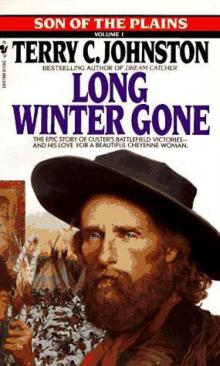 Long Winter Gone sotp-1
Long Winter Gone sotp-1 Dying Thunder
Dying Thunder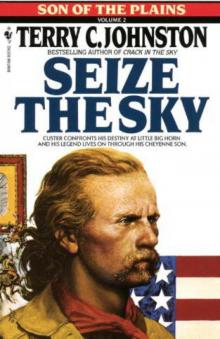 Seize the Sky sotp-2
Seize the Sky sotp-2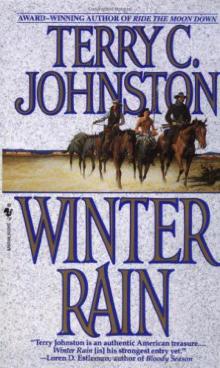 Winter Rain jh-2
Winter Rain jh-2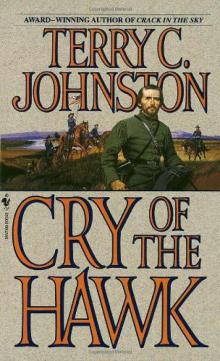 Cry of the Hawk jh-1
Cry of the Hawk jh-1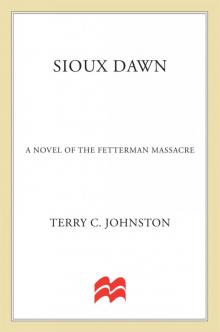 Sioux Dawn, The Fetterman Massacre, 1866
Sioux Dawn, The Fetterman Massacre, 1866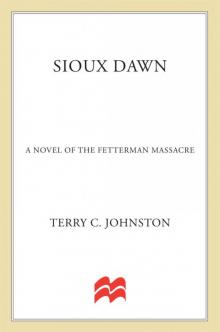 Sioux Dawn: The Fetterman Massacre, 1866 (The Plainsmen Series)
Sioux Dawn: The Fetterman Massacre, 1866 (The Plainsmen Series) Ride the Moon Down
Ride the Moon Down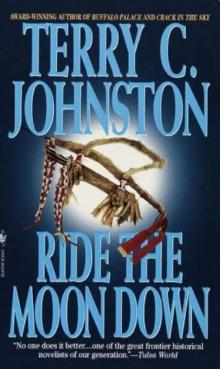 Ride the Moon Down tb-7
Ride the Moon Down tb-7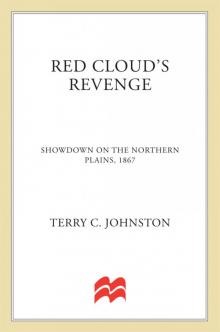 Red Cloud's Revenge
Red Cloud's Revenge Wind Walker
Wind Walker